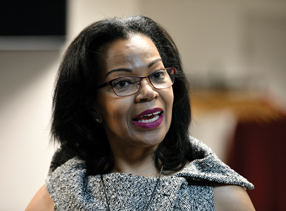2022 Leaders in Graduate Education in International Affairs
THIS GUIDE IS NO LONGER ACTIVE. For the current FP Guide, click here.
Johns Hopkins University School of Advanced International Studies
Diversity in Diplomatic Corps Fosters Improved US Foreign Policy Making

Gina Abercrombie-Winstanley, Former US Ambassador, Chief Diversity and Inclusion Officer for the US Department of State, and Alum of the School of Advanced International Studies, Johns Hopkins University
Former US Ambassador Gina Abercrombie-Winstanley, a 1984 graduate of Johns Hopkins University School of Advanced International Studies (SAIS), recalls the rewards of working on issues in global hot spots, including monitoring elections in the Gaza Strip and coordinating the largest evacuation of American citizens from a war zone since World War II after the outbreak of the Israel-Hezbollah War in 2006. She’s had an exceptional career. But as a Black woman, it’s been a struggle.
Often she was the only woman and person of color at the negotiating table, pushing back against naysayers who were shocked to learn that she was in charge or questioned her ability to lead. Today she serves as the US Department of State’s first chief diversity and inclusion officer, devoted to cultivating a diplomatic workforce that reflects America’s highest values. She is a frequent speaker on diversity and inclusion at schools around the country, including SAIS.
With the challenge of climate change and more points of disruption worldwide, we need diplomats from different backgrounds and perspectives to resolve these issues. That’s why it’s imperative for educational institutions to do a better job of bringing that diversity of thought, experience, and expertise while diplomats are being trained.“With the challenge of climate change and more points of disruption worldwide, we need diplomats from different backgrounds and perspectives to resolve these issues,” she says. “That’s why it’s imperative for educational institutions to do a better job of bringing that diversity of thought, experience, and expertise while diplomats are being trained.”
 The longest-serving US ambassador to Malta, Abercrombie-Winstanley is a seasoned mentor of graduate students and working professionals seeking to advance their careers in diplomacy.
The longest-serving US ambassador to Malta, Abercrombie-Winstanley is a seasoned mentor of graduate students and working professionals seeking to advance their careers in diplomacy.
“I think in an unnecessary way we lose a lot of good people, especially people of color, who we shouldn’t lose,” she says. “We have to work harder to keep them, especially those who are underrepresented in the State Department and other organizations.”
Abercrombie-Winstanley makes time in her schedule for what she calls “mentoring moments,” when she talks one-on-one with a student or a colleague who seeks career advice. “When you find that area or topic that excites you, run with it. Getting up in the morning with a sense of purpose and understanding the importance of what you’re doing is an incredibly satisfying feeling.”
 Learning from Professors Who Are Practitioners Enriches Graduate Student’s Experience
Learning from Professors Who Are Practitioners Enriches Graduate Student’s Experience
Sasha Stone, a second-year student pursuing an MA in International Affairs, took a course on Congress and foreign policy taught by adjunct lecturer Charles Stevenson. Guest speakers included professionals who shared tips about working on Capitol Hill. On the advice of adjunct professor Alina Polyakova, Stone applied for and landed a fall 2021 internship with the U.S. Senate Committee on Foreign Relations. Both professors are well-known practitioners in their fields. “Advice from a professor who’s also a practitioner is invaluable,” says Stone, who hopes to work on the Hill or at the US State Department after graduation, focusing on issues at the intersection of foreign policy and cybersecurity.
Johns Hopkins University School of Advanced International Studies
https://sais.jhu.edu
[email protected]
202-663-5700
Contents
- 2022 Leaders in Graduate Education in International Affairs
- Johns Hopkins University School of Advanced International Studies
- Arizona State University, Thunderbird School of Global Management
- University of Denver, Josef Korbel School of International Studies
- George Mason University, Schar School of Policy and Government
- Tufts University, The Fletcher School


